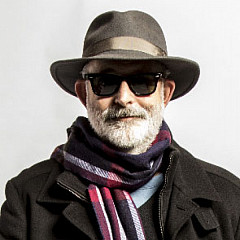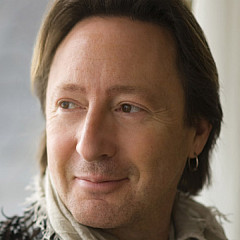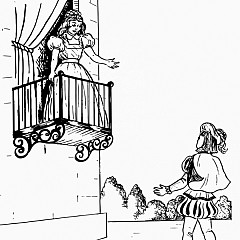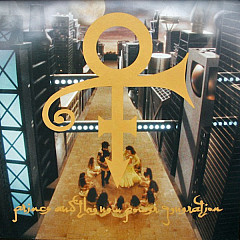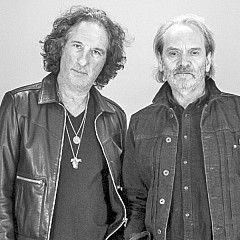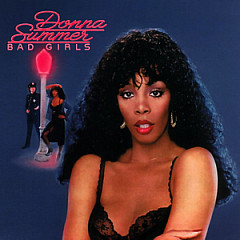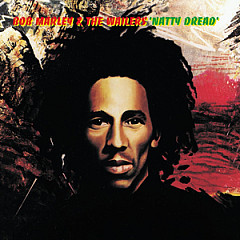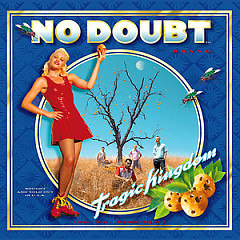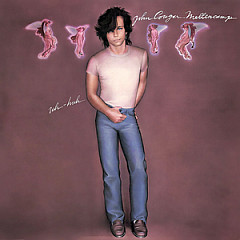 There is no doubt that Aerosmith are American musical icons. They have survived drugs, hedonism, hit records, world tours, internecine conflict, marriages, divorces, car wrecks, MTV, cancer, American Idol, music industry upheaval, bad managers, stolen equipment, egos and the Sgt. Pepper movie. Yet, they are still standing.
There is no doubt that Aerosmith are American musical icons. They have survived drugs, hedonism, hit records, world tours, internecine conflict, marriages, divorces, car wrecks, MTV, cancer, American Idol, music industry upheaval, bad managers, stolen equipment, egos and the Sgt. Pepper movie. Yet, they are still standing.With the release of the DVD Aerosmith Rocks Donington 2014, the filmmakers have captured the band in all their glory, where the music does the talking, proving once and for all what an electrifying live band Aerosmith is, and has been, since their formation in the early '70s when they were young bucks in Boston playing the clubs. Their journey from bar band to superstardom is a tale of perseverance, faith, and an arsenal of captivating songs that still draw thousands to concerts.
Brad Whitford is a major component in helping these songs come to life. Although he is one of the quieter band members, hanging close to Joey Kramer's drum kit instead of parading up and down the catwalk during concerts, his guitar stamp is unequivocally a force to be reckoned with, irreplaceable in the textures of the musical compositions themselves. Joe Perry may have the flair, but Whitford has the bone structure on which Perry can dance. Without him, things could fall apart very quickly.
Not an original member, Whitford came into Aerosmith in 1971, replacing Ray Tabano. "I was 19 years old when I joined Aerosmith, which might seem young until you consider I'd already been in bands for six years," Whitford wrote in the band's autobiographical tome, Walk This Way. At 13, he decided to start his own band after seeing the Dave Clark Five at Boston Garden. That was only the beginning. By the time the summer of 1971 rolled around, Whitford was playing a dive in Sunapee, New Hampshire, when Perry and Aerosmith bass player Tom Hamilton came to check him out. A week later he was asked to join, and the rest is rock and roll history.
The Perry/Tyler team dominates Aerosmith's songwriting, but the other members show up in the credits from time to time. One of Whitford's contributions is "Last Child," which appears on the 1976 album, Rocks. The song remains a staple of the Aerosmith live show almost 40 years later. In our interview with Whitford, he talks about the creation of that song as well as a few others that are often overlooked.
Brad Whitford: Probably getting to stand right on stage and watch the Deep Purple set [Laughs].
You know, Donington is one of those premier rock events and you get to see all these people maybe you haven't seen in quite a long time, people from other bands and stuff. It's always fun backstage getting to see some of the other bands like Deep Purple. It was really fun for us.
Whitford: Oh gosh, I thought it was only twice but it could be three times. My memory doesn't serve me that well any more.
Songfacts: Do you have a favorite moment during an Aerosmith show – a song or two that you still love to play over all the others?
Whitford: Oh, I would have to say that it's always fun to play "Last Child," a song that Steven and I put together many years ago that we hold near and dear. It gives me a chance to play a little bit [Laughs].
But they really are all great songs to play. It does not get boring.
Songfacts: How did "Last Child" actually get started for you?
Whitford: We were working in our rehearsal studio and it was the end of the day, so everybody was kind of packing up and going home. Typically, I was continuing to play and create something and I started playing this thing. Steven came in the room and immediately sat behind the drums and started to play. And that was where the song was born, right then and there.
It started with the main riff of the tune and BANG, it just kind of came out of nowhere. Next thing you know, we were in the studio recording it. It was just one of those things.
 Sometimes they happen like that, and I'm sure you've heard this before, but some songs take forever to come out, and sometimes they're just given to you in a flash, like a zip drive, you know. You plug it in and BANG, there it is and you say, "Where did that come from?" That was one of those ones that just kind of came up out of nowhere and there it was.
Sometimes they happen like that, and I'm sure you've heard this before, but some songs take forever to come out, and sometimes they're just given to you in a flash, like a zip drive, you know. You plug it in and BANG, there it is and you say, "Where did that come from?" That was one of those ones that just kind of came up out of nowhere and there it was.Songfacts: What did you think when Steven started rhyming Tallahassee and sassafrassee? Was that like a head scratching moment for you or were you used to it by then?
Whitford: I was used to it - that's his thing, you know.
It's become such a classic lyric now. A friend of ours out of Chicago did a whole interpretation, a whole CD of a bunch of our songs in a very traditional blues fashion, and it was amazing to hear Steven's lyrics in this sort of blues approach, and it really exemplified how great his lyrics are. Just hearing someone else do them with a different approach gave it a different focus for me.
Songfacts: You also had a hand in creating "Nobody's Fault" on Rocks as well.
Whitford: One of the things I am most proud of about that song is a very good friend of mine has been touring with Jeff Beck the past few years and they were on the bus one night and everybody was playing music and they were talking about Aerosmith. Jeff put it on and said, "This is my favorite Aerosmith song." He put it on and it was "Nobody's Fault." When I heard that was Jeff's favorite Aerosmith song, I just felt like I had arrived.
Songfacts: Out of all the songs that you have played with Aerosmith, which one would you say was the most difficult or complicated to transfer to the live stage?
But not too many. I don't think there's any great difficulty in transferring these to the stage. It's more about the chemistry and the energy that you have to bring to it that makes it work.
Songfacts: What else can you tell us about "Kings and Queens"?
Whitford: Well, it was kind of at a point where we were working on a particular record [Draw The Line] and a lot of what we were doing in getting ready to record all that music, a lot of it was Joey, Tom and myself and Jack Douglas [producer] doing a lot of work on our own, and that's where a lot of that song came from. It was kind of us guys left to ourselves - Joe and Steven weren't there at that point.
It probably would have ended up sounding different if they were there, but we were able to stretch out a little bit and hit a chord with that tune. We had the basis of it, and when Steven heard it, it really appealed to him and he came up with those great lyrics. It was just one of those things.
Songfacts: Do you remember which song in the band's history had the biggest change from it's original conception to the final recorded version?
Whitford: We did that song called "Big Ten Inch Record" and we were basically just doing it as a two-guitar, rock and roll approach. We were up in the studio recording it, and we were listening very heavily to the original version of the song, which was very similar to what we ended up with when we ended up bringing the horn section in. We decided, "Let's actually make it sound a little more period. Let's have the horns on it and make it sound more like the original version that we heard."
So that was quite a transformation, going from this straight-ahead guitar thing to almost a big band sound. And it really worked.
Songfacts: Was there a song that you personally fought real hard to have changed to go in a different musical direction than it was going?
Whitford: Oh gosh, I can't think of one in particular but I can tell you that everybody in this band has very strong opinions [Laughs] and usually we go back and forth with a lot of it: how it should be, how it should sound, a lot of experimentation. We try to let ideas fly, so everybody really has a hand in that, in shaping these songs.
Songfacts: Is there a song you think should have gotten more attention than it did?
Whitford: There are some that I thought might have a stronger appeal. I remember we did a song called "Hole In My Soul." Maybe it was just too depressing, but I remember being in the studio thinking that this sounded to me like it would end up being played on the radio or having more appeal than it ended up having.
But that's what we go through. You create this music and you always have high hopes for it and it doesn't always work out that way.
Based upon The Beatles masterpiece album, it features Frampton and the Gibb brothers as members of the infamous band trying to save their town from evil. Beatles producer George Martin was musical director. Aerosmith portrayed the Future Villain Band, performing "Come Together" near the end of the film.
Whitford: I've actually never heard anybody say that [Laughs]. But you know, it's funny, I hear our version more on the radio than I do The Beatles' version. But that's a good question. We just thought it was a great song. It happened to be part of that whole Sgt. Pepper thing and it was an amazing recording session because we got to work with The Beatles' producer and our producer. It was a fun project.
In 1981, prior to his departure from the band, Whitford made an album with Ted Nugent singer Derek St. Holmes. The pair are once again working on a project together.
Whitford: Yeah, we did an album years ago in the early '80s, Derek and I, and we've always maintained a great relationship. We're practically neighbors now, so it gave us the opportunity to do a lot of playing together. We started writing a bunch of new songs and we're just about finished with the new recording. We're going to take it on tour in November, which will be our first foray into playing it live. So yeah, we are very excited about it. We had a lot of fun with it. It's a really good creative outlet for me.
Songfacts: Do you know when the CD will be out?
Whitford: No, I don't, but we're going to be touring in November and I think at that point maybe one of the first songs will kind of get out there. Probably the CD won't. I'm thinking it will probably be after the first of the year that we'll actually have it available.
September 3, 2015
Photos: Dan DeSlover (1), Ross Halfin (2)
More Aerosmith interviews:
Steven Tyler
Joe Perry
More Songwriter Interviews


